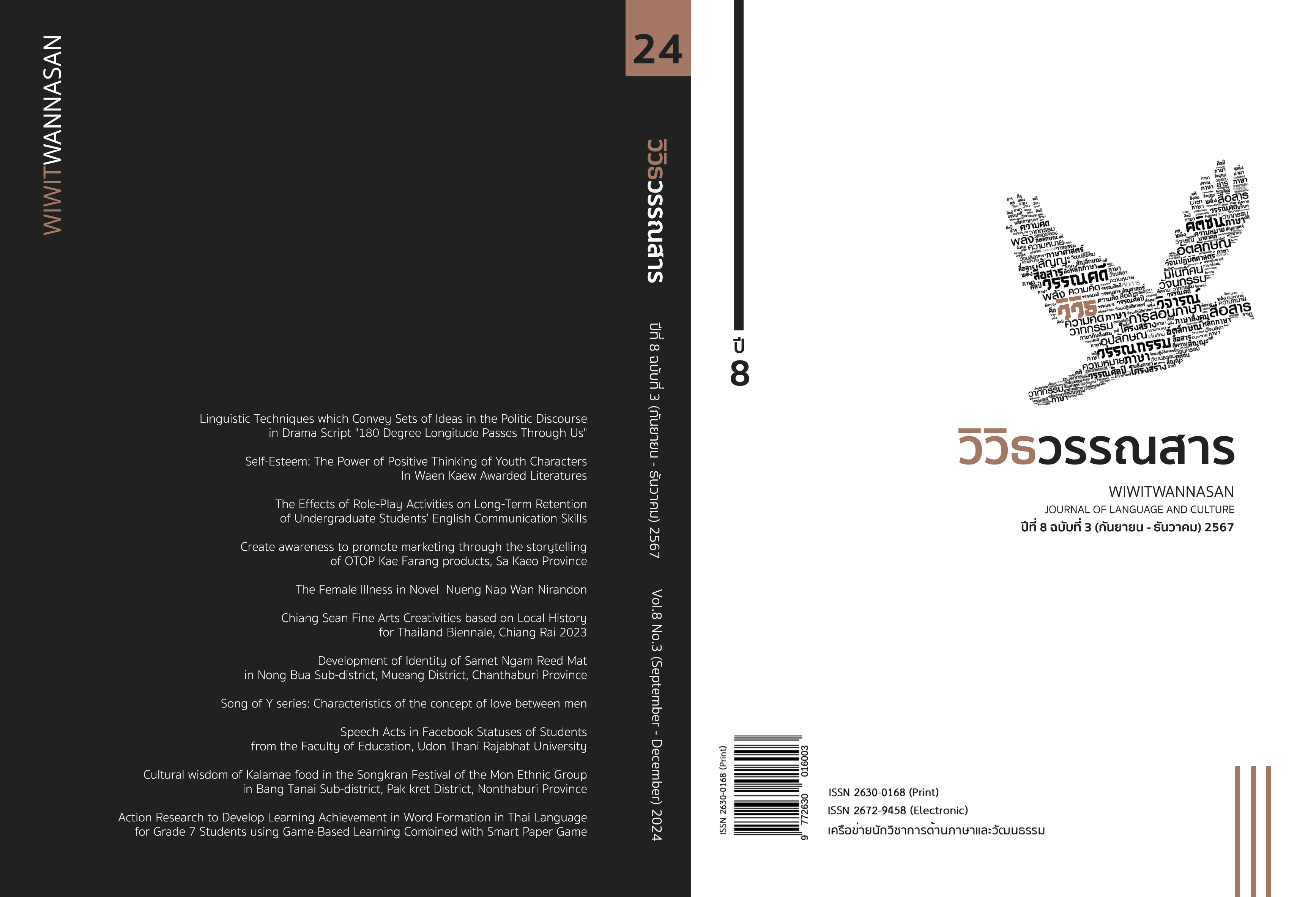การวิจัยเชิงปฏิบัติการเพื่อพัฒนาผลสัมฤทธิ์ทางการเรียน เรื่อง การสร้างคำในภาษาไทย สำหรับนักเรียนชั้นมัธยมศึกษาปีที่ 1 โดยใช้การจัดการเรียนรู้แบบเกมเป็นฐาน ร่วมกับสื่อเกมกระดาษอัจฉริยะ
Main Article Content
บทคัดย่อ
การวิจัยครั้งนี้มีวัตถุประสงค์ 1) เพื่อพัฒนาผลสัมฤทธิ์ทางการเรียน เรื่อง การสร้างคำในภาษาไทย สำหรับนักเรียนชั้นมัธยมศึกษาปีที่ 1 โดยใช้การจัดการเรียนรู้แบบเกมเป็นฐานร่วมกับสื่อเกมกระดาษอัจฉริยะ 2) เพื่อเปรียบเทียบผลสัมฤทธิ์ทางการเรียน เรื่อง การสร้างคำในภาษาไทย สำหรับนักเรียนชั้นมัธยมศึกษาปีที่ 1 โดยใช้การจัดการเรียนรู้แบบเกมเป็นฐานร่วมกับสื่อเกมกระดาษอัจฉริยะกับเกณฑ์ร้อยละ 70 และ 3) เพื่อศึกษาความพึงพอใจของนักเรียนชั้นมัธยมศึกษาปีที่ 1 ที่ได้รับการพัฒนาผลสัมฤทธิ์ทางการเรียน เรื่อง การสร้างคำ
ในภาษาไทย โดยใช้การจัดการเรียนรู้แบบเกมเป็นฐานร่วมกับสื่อเกมกระดาษอัจฉริยะ กลุ่มตัวอย่างที่ใช้ในการวิจัย คือ นักเรียนชั้นมัธยมศึกษาปีที่ 1 ภาคเรียนที่ 1 ปีการศึกษา 2567 โรงเรียนมัธยมหลวงพ่อคูณ ปริสุทฺโธ จำนวน 10 คน ซึ่งได้มาจากการสุ่มแบบกลุ่ม โดยใช้การวิจัยเชิงปฏิบัติการ 4 ขั้นตอน ประกอบด้วย 1) ขั้นการวางแผน 2) ขั้นการลงมือปฏิบัติ 3) ขั้นสังเกตการณ์ และ 4) ขั้นการสะท้อนผล เครื่องมือที่ใช้ในการวิจัย ประกอบด้วย 1) แผนการจัดการเรียนรู้ 2) แบบทดสอบวัดผลสัมฤทธิ์ทางการเรียน 3) แบบสังเกตพฤติกรรมระหว่างเรียนของนักเรียน 4) แบบบันทึกการสัมภาษณ์นักเรียน และ 5) แบบวัดความพึงพอใจ วิเคราะห์ข้อมูลโดยใช้การวิเคราะห์ค่าเฉลี่ย ส่วนเบี่ยงเบนมาตรฐาน สถิติทดสอบค่าที (t – test) และสร้างข้อสรุปโดยการพรรณนา
ผลวิจัยพบว่า
- ผลการพัฒนาผลสัมฤทธิ์ทางการเรียน เรื่อง การสร้างคำในภาษาไทย สำหรับนักเรียนชั้นมัธยมศึกษาปีที่ 1 โดยใช้การจัดการเรียนรู้แบบเกมเป็นฐานร่วมกับสื่อเกมกระดาษอัจฉริยะ ในปฏิบัติการวงรอบที่ 1 นักเรียนบางคนสร้างคำไม่ถูกต้องและผลการทดสอบวัดผลสัมฤทธิ์ทางการเรียนไม่ผ่านเกณฑ์ที่ตั้งไว้ จึงนำผลไปปรับปรุงในปฏิบัติการวงรอบที่ 2 จนนักเรียนสามารถทำคะแนนในแบบทดสอบวัดผลสัมฤทธิ์ทางการเรียนผ่านเกณฑ์ที่ตั้งไว้
2) ผลการเปรียบเทียบผลสัมฤทธิ์ทางการเรียน เรื่อง การสร้างคำในภาษาไทย สำหรับนักเรียน
ชั้นมัธยมศึกษาปีที่ 1 โดยใช้การจัดการเรียนรู้แบบเกมเป็นฐานร่วมกับสื่อเกมกระดาษอัจฉริยะกับเกณฑ์ร้อยละ 70 ในปฏิบัติการวงรอบที่ 1 โดยภาพรวมไม่ผ่านเกณฑ์ที่ตั้งไว้ มีคะแนนเฉลี่ยเท่ากับ 20.80 คิดเป็นร้อยละ 69.33 และปฏิบัติการวงรอบที่ 2 ผ่านเกณฑ์ที่ตั้งไว้ มีคะแนนเฉลี่ยเท่ากับ 24.80 คิดเป็นร้อยละ 82.67 แสดงให้เห็นว่าผลสัมฤทธิ์ทางการเรียนหลังการจัดการเรียนรู้แบบเกมเป็นฐานร่วมกับสื่อเกมกระดาษอัจฉริยะสูงกว่าเกณฑ์
ร้อยละ 70 อย่างมีนัยสำคัญทางสถิติที่ระดับ .05
3) ผลการศึกษาความพึงพอใจของนักเรียนชั้นมัธยมศึกษาปีที่ 1 ที่ได้รับการพัฒนาผลสัมฤทธิ์ทางการเรียน เรื่อง การสร้างคำในภาษาไทย โดยใช้การจัดการเรียนรู้แบบเกมเป็นฐานร่วมกับสื่อเกมกระดาษอัจฉริยะ ในภาพรวมอยู่ในระดับมากที่สุด โดยมีค่าเฉลี่ยเท่ากับ 4.76 และมีส่วนเบี่ยงเบนมาตรฐานเท่ากับ 0.23
Article Details

อนุญาตภายใต้เงื่อนไข Creative Commons Attribution-NonCommercial-NoDerivatives 4.0 International License.
ลิขสิทธิ์ของบทความเป็นของวารสาร การพิมพ์ซ้ำจะต้องได้ร้บการอนุญาตจากบรรณาธิการวารสาร
เอกสารอ้างอิง
Aguilar-Cruz, P. J., Wang, P., Xiang, Z. & Luo, H. (2023). Factors Influencing Game-Based Learning in the Colombian Context: A Mixed Methods Study. Sustainability, 15 (10), 7817. doi:10.3390/su15107817
Chirawanpong, P. (2013). Games-Based Learning. Bangkok: Srinakharinwirot University Prasarnmit. (In Thai)
Chitchayawanit, K. and Kongcharoen, K. P. (2022). The Science of Social Studies Learning Management. (3rd ed.). Bangkok: Chulalongkorn University Press. (In Thai)
Dadee, W. (2010). Game-Based Learning Theory. Blogspot. http:// nuybeam.blogspot.com/2010/08/game-based-learning.html (In Thai)
Kaemmanee, T. (2023). 14 Teaching Methods for Professional Teachers. (14th ed.). Bangkok: Chulalongkorn University Press. (In Thai)
Kaweewong, K. (2012, March 14). Summary of Academic Articles on Happy Learning. The 3rd Meeting of the Committee on Education and Psychological and Social Knowledge Development 2012. http://legacy.orst.go.th (In Thai)
Kemmis, S. & McTaggart, R. (1988). The Action Research Planer (3rd ed.). Victoria: Deakin University.
Klinlokai, P. (2010). Development of Learning Activities Using Games to Improve Learning Achievement in the Thai Language Subject for Grade 1 Students at Ban Koh School, Minburi District, Bangkok (Master’s Thesis). Khon Kaen University. (In Thai)
Khunphon, S. (2023). Game-Based Learning to Improve Learning Achievement in Mathematics for Grade 7 Students. Journal of Education, Mahamakut Buddhist University, 11 (2), 247-259. (In Thai)
Luangangkool, N. (2020). Action Research for Teaching and Learning Development. Khon Kaen: Faculty of Education, Khon Kaen University. (In Thai)
Luang Pho Khoon Parisuttho Secondary School. (2022a). Internal Quality Assessment Report for Luang Pho Khoon Parisuttho Secondary School, Academic Year 2022. Nakhon Ratchasima. (In Thai)
Luang Por Koon Parisuttho Secondary School. (2023b). Internal Quality Assessment Report for Luang Pho Khoon Parisuttho Secondary School, Academic Year 2022. Nakhon Ratchasima. (In Thai)
Naiphat, O. (2005). Quantitative and Qualitative Research Methods in Behavioral and Social Sciences. Bangkok: Samlada. (In Thai)
Office of Academic Affairs and Educational Standards. (2017). Active Learning. Academic Obec. https://academic.obec.go.th/images/document/1603180137_d_1.pdf (In Thai)
Phongboriboon, Y. (1994). Action Research. Khon Kaen University Journal of Education, 17, 11-15. (In Thai)
Prawalpuek, V. (1995). The Action Research Planner. (1st ed.). Bangkok: Department of Curriculum and Instruction Development. (In Thai)
Puangkaew, P. (2020). The Science of Social Studies Learning Management. Bangkok: Chulalongkorn University Press. (In Thai)
Sinlarat, P. (2023). Learner-Centered: 27 Teaching Methods to Develop Learner Potential. Bangkok: Chulalongkorn University Press. (In Thai)
Sinthapanon, S. , Sookying, F. , Weerakiattisonthorn, J. , and Naparat, P. (2019). Various Teaching Methods for Youth Development. Bangkok: 9119 Technic Printing. (In Thai)
Suthirat, C. (2009). 80 Innovations in Learner-Centered Learning. Bangkok: Kanak Inter Corporation. (In Thai)


